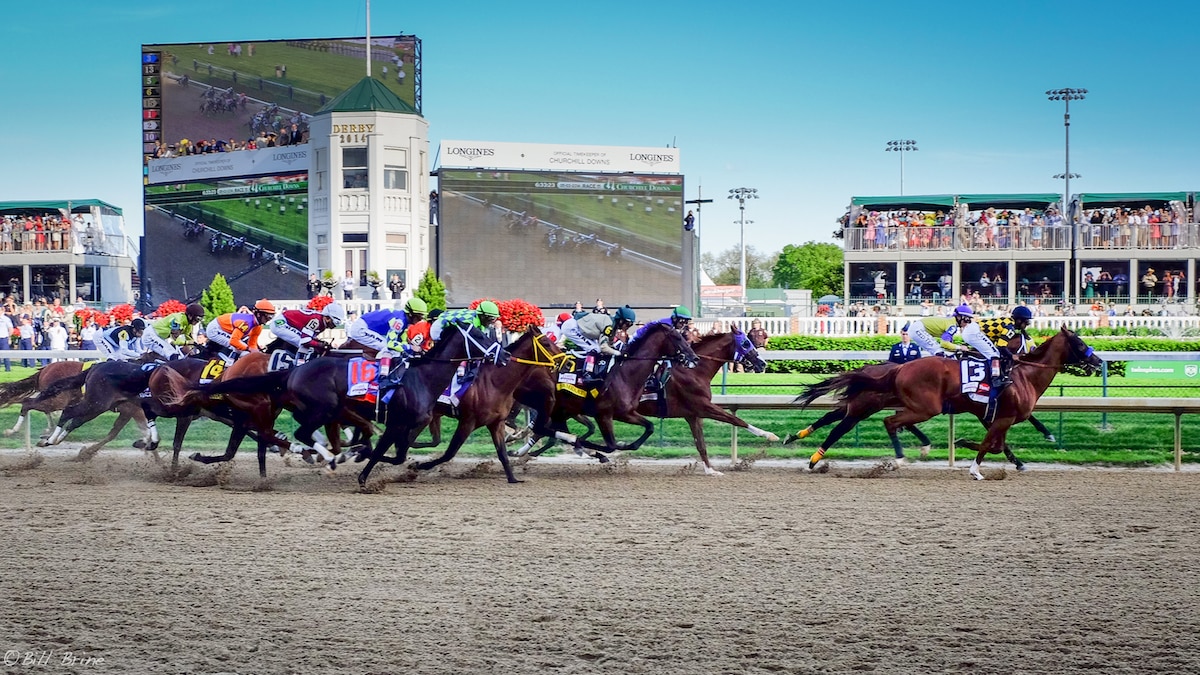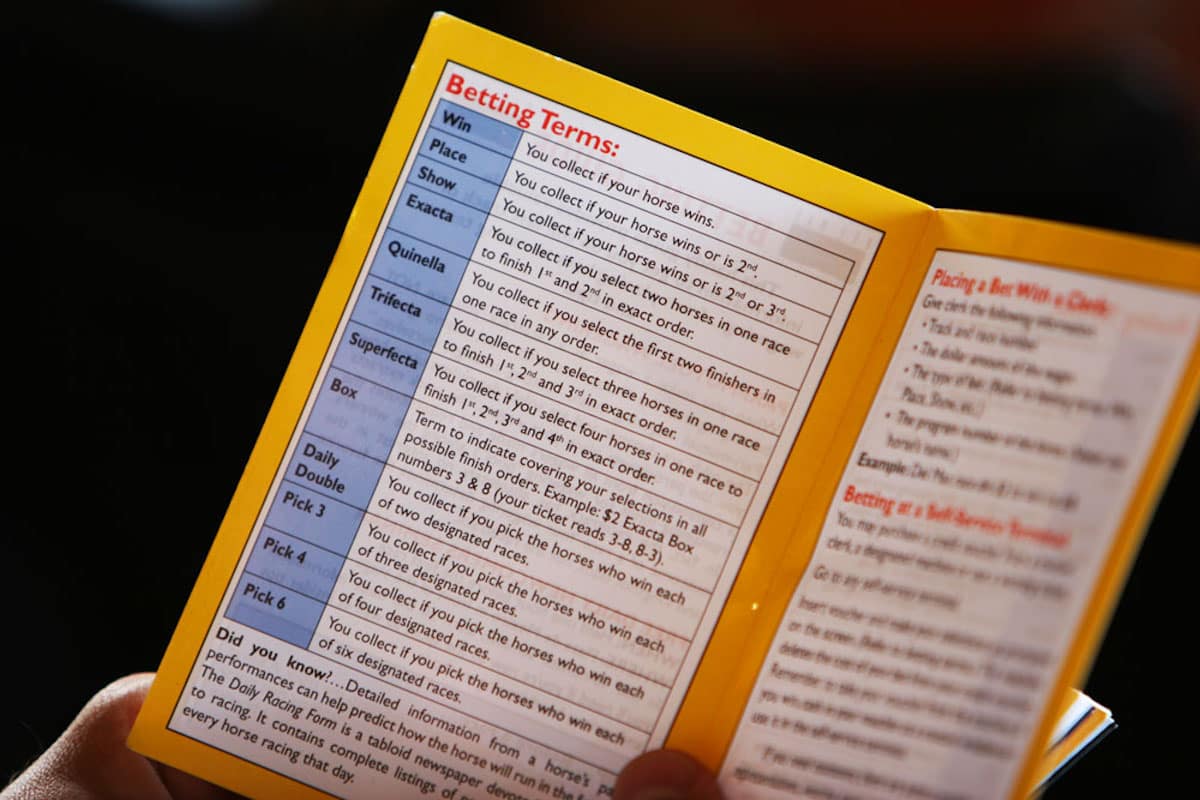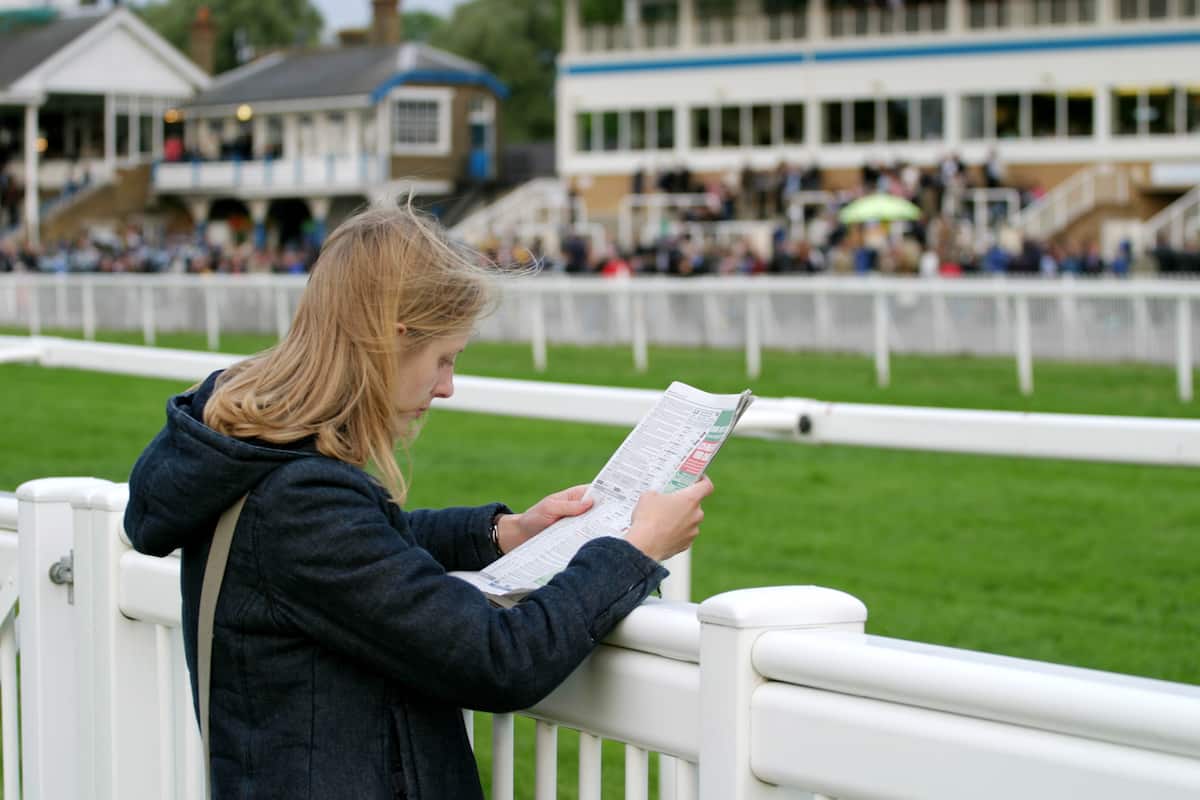A guide to handicapping a horse race that any Thoroughbred fan can follow

The Kentucky Derby, with its large field of runners and massive betting pool, makes for bigger payouts, even when you play the favorite. Flickr CC via Bill Brine
One of Miranda Kriha’s fondest memories as a young girl is going to the now-defunct racetrack in Lincoln, Nebraska, where her father taught her the basics of how to read the Daily Racing Form and play the ponies.
“It was just another ‘puzzle’ to figure out, so I can thank my dad for inheriting that kind of analytical mind,” says Kriha, now 29.
It was during those warm afternoons spent handicapping (a fancy word for betting) with her father at their quaint hometown track that she developed a lifelong passion for the horse industry.
“I’d get a $10 wagering pool to play with, and my dad would go bet and cash tickets for me,” Kriha says. “One day I picked a 40-1 long shot horse that won, the ticket paid more than $500 and (my parents) let me keep the entire winnings. I can definitively say from that ticket I was hooked.”
As Kriha got older, she began to notice the racing industry outside of Nebraska and became enamored by all the big races, including the Kentucky Derby and Breeders’ Cup World Championships. She started following specific horses and trainers and found she had a knack for betting — and winning.
Kriha moved to Lexington, Kentucky, in 2015 in hopes of becoming more involved in the horse industry. She now works as a graphic designer and web producer for a local company that serves Thoroughbred racing clients. In her spare time she continues to find success with her handicapping hobby.
Here are some tips from Kriha and other handicappers for picking a winning Thoroughbred on the track.
Small Wagers, Small Fortune
While Kriha enjoys placing her own wagers and cashing tickets, she also finds great satisfaction in passing along her handicapping knowledge to others. The most important piece of wisdom she says she always shares with beginners is to “start small and be modest.”
If she loses a bet, little money has gone down the drain. If she wins, the rewards could be significant.
The simplest form of betting is to place money on a horse to win, place or show (run first, second or third, respectively). You can place as little as $2 on a horse, and its odds when it leaves the starting gate will determine how much you might win. If your horse crosses the finish line first, you’ll receive that odd’s profit plus the amount you bet. So, for instance, if the winner went off at 5-2 odds, it will pay $5 for every $2 wagered, for a $7 payoff per $2 bet.
The more money people bet on a horse, the lower its odds become and the less money you will make if that horse wins. On the flip side, if more people are betting on that horse, chances are it’s for good reason, and the likelihood of that horse winning might be greater.
A horse with high odds means fewer people have placed bets on it, perhaps because it’s inexperienced or hasn’t won in a while. But the higher a horse’s odds, the more money you could make if he wins. Betting on horses with the highest odds can prove to be exciting, because the rewards are more significant (and you might look like the smartest person in the grandstand for picking the underdog).
Other types of bets include exactas (picking the first- and second-place finishers of a race), trifectas (picking the first-, second- and third-place finishers) and superfectas (picking the first- through fourth-place finishers).
As an experienced handicapper, Kriha enjoys more exotic forms of betting. Her favorite wagers are multirace bets, such as the pick-4, pick-5 and pick-6. As the names suggest, placing these kinds of bets requires selecting the winning horses of four to six races in a row.
“I think there’s much more opportunity in the exotics, if you want to put in the work,” Kriha says, reiterating that part of her success stems from being conservative in the amount she bets. If you play your cards the right way, she explains, even the most conservative bets can pay big dividends.
For example, Kriha’s biggest victory was on 2018 Fountain of Youth Stakes Day at Gulfstream Park, in Florida. She spent $28 on a pick-6 ticket and wound up correctly choosing the winning horses of six races in a row, which resulted in a whopping $52,859.78 payout.
“I bought a new mattress, and it gave me a great down payment for a house,” Kriha says.

The simplest form of betting is to place money on a horse to win, place or show. Flickr cc via kellinahandbasket
Winners Win
Now that we’ve learned about the basic types of bets you can place, let’s discuss some wagering tactics for a successful (and fun) day at the track.
Longtime handicapper Ed DeRosa, of Goshen, Kentucky, offers a simple, yet valuable, phrase of wisdom: “Winners win.” DeRosa serves as director of communications at Churchill Downs’ online wagering site Twinspires.com and director of marketing at racing data resource Brisnet.com.
By studying a racetrack program (find an easy guide to reading a program at Keeneland.com/racing/how-read-program), you can best determine which horses are most capable of winning on a given day based on their past performances.
“You want to find horses who win more often than not or at least more often than other horses in the race,” DeRosa says. “Those are the ones that are going to have a better chance.”
When it comes to maiden races (those in which none of the horses entered have ever won) or lower-level contests, such as claiming races (those in which many of the horses might have not won in a while), DeRosa suggests going to the next step, which is to bet on the horses that have finished second or third in their previous races most frequently.
“Basically, you want to find some indication of competitiveness,” he says. “That’s definitely the first step to me … understanding which horses have the will to win or have won and are competitive.”
Do Your Own Research
While each handicapper has his or her own wagering method, all usually have one thing in common: They do their homework before placing a bet. Here’s where understanding a racetrack program can pay off.
“A lot of handicapping analysts (on television and racing websites) are helpful and offer good insight but honestly, if you’re spending your money, you should learn to study the Racing Form and do your own work,” Kriha says.
For Kriha, this work can get complicated. She narrows down top contenders based on past speed figures, the connections (owner, jockey and trainer) and, of course, how the horse has performed in the past.
A beginner might find the process complicated at first and might want to simplify things by picking a horse with a favorite number, racing silk color or meaningful name.
While betting can be a game of skill, it can also be a game of luck, and beginners have just as good of a chance as the most experienced handicapper if the racing gods are on their side. And if not, tomorrow is always another day.
Consider the Win Bet
Let’s get into more detail as to why win betting might be one of the best types of wagers for average racing fans.
DeRosa favors win betting because you can take more ownership of choosing a winner, which raises the excitement level.
“I’m a big proponent of telling people not to shy away from win betting,” says DeRosa. “It’s easy to understand … if you bet a horse to win and it wins, then you win. Not only that, but you know what you win because the horse’s odds are on the board.”
While place, show and other exotic bets can also be fun for both beginners and experienced handicappers, it’s often unclear what the payout will be until after the race. Further, while it might be easier to correctly choose a horse to finish either second or third, the payout is much less, which can diminish the excitement.
“If you’re playing not to lose, it’s one thing, but if you’re comfortable gambling … then there’s no reason not to bet horses to win, even as a beginner,” says DeRosa.
Find a Mentor
One of the best ways for beginning handicappers to get the most enjoyment out of a day at the races is to buddy up with a friend who is already knowledgeable about betting. With someone else guiding you, your chances of understanding the game — and winning — could improve.
“Find somebody who has been there, done that and isn’t going to take their gambling too seriously,” says Joe Kristufek, lead racing analyst for Churchill Downs and Fair Grounds Races & Slots. “It should be someone who likes to go to the track and socialize, but who also knows and understands the game … and will also answer your questions and wants you to enjoy the experience.”
The face of America’s Best Racing’s “Racing 101” series, Kristufek has written a series of online articles for the beginning handicapper. He is a self-proclaimed racing “ambassador,” and fan development is his longtime passion.
Kristufek’s most memorable wagering experience was when Monarchos won the 2001 Kentucky Derby. He had collected $3,000 from friends and co-workers and placed several superfecta bets on the Derby that year.
“We ended up winning $65,000,” he says. “There was so much self-gratification in being right, being able to share that with all those people, put money in their pockets and show them if you do pay attention to horse racing, you can cash tickets.
“To me, (racetrack wagering) is a fascinating puzzle, and the more I learned about it, the more I loved it,” he adds. “It’s not for everybody … you can enjoy it from a social perspective, but if you really get into it, it’s really fascinating. There’s a lot to learn and a lot of trial and error, but it’s challenging and a lot of fun.”

The racetrack program can help you best determine which horses are most capable of winning on a given day based on their past performances. istock.com
Betting the Derby
The Kentucky Derby is a unique opportunity for handicappers because it contains one of the largest pools of money from bettors in one day, as well as a large field of horses to choose from (up to 20 runners).
“Bigger field without a doubt means bigger payouts,” DeRosa says. “There’s no question that with more horses, even with the favorite winning as it has in the Derby the past few years, the payouts are larger than your run-of-the-mill day.”
But how do you narrow down your choices in a field so large?
DeRosa suggests joining forces with friends to choose different win bets and to also consider exotic bets such as the superfecta.
“The superfecta is a must-play on Derby Day,” he says. “It pays so well, versus the same scenario on any other day, that it’s just a great opportunity. In the Derby, if you get that superfecta right, more often than not it will pay thousands of dollars, sometimes tens of thousands of dollars. It’s the one race you can go into thinking, ‘If I do this right, I can make a score of the year, or maybe even the score of a lifetime.’ ”
Kriha believes a successful experience at the Derby can largely stem from the research one puts into it. She suggests watching videos of Derby horses’ past races and looking at their workouts (listed in the track program and at KentuckyDerby.com) at Churchill Downs prior to the Run for the Roses.
“The Kentucky Derby website will post (the time of) every single work the horses have at Churchill and other tracks a few weeks out,” Kriha says. “They’ve also started streaming/posting the morning training time for the contenders. This is huge to see how the horses are acting days out from the race. Are they focused? I really pay attention to how they’re moving over Churchill’s dirt and if they look like they’re climbing (struggling) or if they are fluid.”
With some knowledge and a little luck, the Derby could make for a memorable experience in more ways than one, says DeRosa.
“That’s part of the lure of the Derby for me … the tradition and pageantry are great, and it’s the most important race of the year to a lot of people and to the gamblers, as well,” he says. “It’s the one race where you’re looking for a big score.”
This article was originally published in the Spring 2019 issue of Off-Track Thoroughbred Magazine, the only publication dedicated to the Thoroughbred ex-racehorse in second careers. Want four information-packed issues a year delivered to your door or your favorite digital device? Subscribe now!

